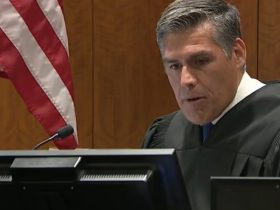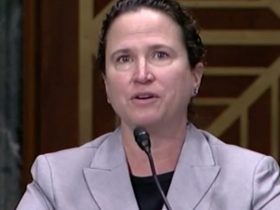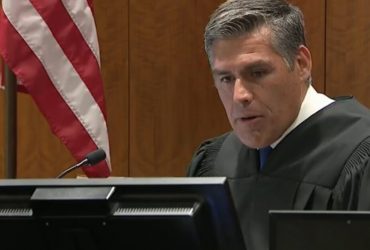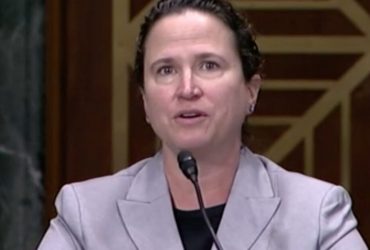U.S. Congresswoman Marjorie Taylor Greene speaking with attendees at the 2021 AmericaFest at the Phoenix Convention Center in Phoenix, Arizona. (Credit: Gage Skidmore/Flickr)
Congresswoman Marjorie Taylor Greene has sent an official request to the Department of Justice and the Federal Bureau of Investigation seeking an investigation into the 2020 Presidential Election in Georgia.
The formal request addressed to Marshall Yates, the FBI’s Assistant Director in the Office of Congressional Affairs, and Dario Camacho, the Supervisory Official of the Office of Legislative Affairs, calls for an investigation specifically into the Secretary of State’s Office and Fulton County.
In July, the Georgia State Election Board passed a resolution asking for an investigation into “outstanding allegations,” specifically SEB complaint 2023-025. This complaint was a product of the extensive research and investigation conducted by Kevin Moncla of the Election Oversight Group and Joseph Rossi.
The formal request states:
The Georgia State Election Board (SEB) passed a resolution on July 30, 2025, asking the Secretary of State and Attorney General of Georgia to seek the assistance of the Department of Justice in resolving outstanding allegations regarding violations of Georgia and federal election
law in recent elections. Specifically, the resolution referenced SEB complaint number 2023-025, which alleged that there was serious error by the Fulton County Board of Elections (BOE) in the 2020 election. While the Secretary of State and Fulton BOE reached a negotiated settlement, the
SEB has ruled that the matter has not been decided. In an effort to complete the investigation, the SEB issued a subpoena for 2020 election documents to the Fulton BOE, but they have refused to comply.
Because the Georgia Attorney General and Secretary of State have declined to investigate this matter or provide assistance to the SEB, federal involvement is necessary. This case demonstrates that the public records and other extant documents include sufficient information to
start an investigation of unreconciled election data, improper procedures, and the failures of the Georgia election system overall, including the machine-related components of that election system.
ltr-mtg-formal-request-investigation
The Culling vs. Raffensperger Lawsuit: Evidence of Voting Machine Vulnerabilities and Fulton County 2020 Election Issues Entered into the Federal Record
Joe Biden allegedly won Georgia by 11,790 votes in the November 3 election after two machine counts with a hand recount in between. The hand recount in Fulton County revealed several thousand votes that had not been initially tallied.
The Gateway Pundit has written extensively about SEB 2023-025, including a four-part series that uncovered numerous discrepancies in Georgia’s election, with a primary focus on Fulton County. Discrepancies included 17,852 votes of “unknown provenance” (no physical ballot was in evidence) and 20,713 votes that were counted from “unreported and unidentifiable tabulators” in the November 3rd totals.
The ten tabulators used for the 20,713 votes have no record of existing, according to the tabulator tapes, which include serial numbers for the tabulators. Open Records Requests to Fulton County were returned with “No such records” when asked for information regarding those specific tabulators.
No poll closing tapes were provided. No Logic and Accuracy test logs. They are not listed in the distribution logs or the machine pick-up logs. They apparently don’t exist.
To ensure this wasn’t a mistake, the complainants did Open Records requests with the Fulton County Custodian of Records, Steve Rosenberg, to “confirm they don’t exist.” The Records Department replied, “This request has no additional responsive records.”
Links to Parts 1-3 can be found in Part 4 of the series below:
The Culling vs. Raffensperger Lawsuit: Evidence of Voting Machine Vulnerabilities and Fulton County 2020 Election Issues Entered into the Federal Record
SEB 2023-025 also documents the discrepancies between the original machine count and the second machine count performed on November 24th, 2020. Machine Count 1 (MC1) showed there were 528,777 ballots tabulated while on December 2, 2020, Machine Count 2 (MC2) showed 511,543, a difference of 17,234 fewer votes in MC2.
On December 4th, after the completion deadline, Fulton County “found” 16,382 votes.
From The Gateway Pundits’ September 2023 reporting:
So where did those 16,382 votes come from? Through an Open Records Request on an unrelated topic, Kevin Moncla, the complainant, stumbled upon an email dated December 3, 2020, from Fulton County Elections Director Rick Barron to Ryan Macias of the Elections Group. Macias was formerly the acting Director of the EAC’s testing and certification and is a “Subject Matter Expert” for the Cybersecurity and Infrastructure Security Agency (CISA).
Included in that email obtained through Open Records Request was a PDF file titled “Batches Loaded Report.xml”. The report showed 511,543 votes “tabulated and published.” According to the complaint:
To ensure the report was not outdated or irrelevant, we opened the file in its native format
(.XML) using a web browser which revealed relevant timestamps for both the email and the
attached report:
As can be seen in the image above, the document itself contains the timestamp of the Batches
Loaded Report (BLR) “2020 12-03T 17:06:29Z”, or December 3rd 2020, at 17:06:29 Zulu Time. (Note: Zulu time is 5 hours behind Eastern Standard Time)
This shows that the “Batches Loaded Report” attached to the email was made 6 minutes before the email was sent. The email itself was sent 12 hours after the “deadline” to submit MC2 results.
Fulton County made the following tweet on Dec 3 at 12:52am, 12 hours before the email between Barron and Macias:
Fulton County has completed the recount of the November 3 Presidential Election. Results will be released by the Secretary of State’s Office.
— FultonCountyGeorgia (@FultonInfo) December 3, 2020
During a December 4th meeting to certify the vote, Barron told Fulton County BRE that a scanner had two sets of 62 batches with the same identification, which led to the failure to count one of those batches. It was resolved by scanning those batches on a separate scanner. The following is queued up to the relevant statement from that meeting (29:57-30:30):
From Barron’s statement above, he claims:
“There are “only two ways you can do it (resolve the issue). Either you have to append those batches at the end or you can scan them on different scanners. So we used the different scanners rather than appending them on the end.”
While Barron said he chose to rescan those 62 batches instead of appending them, there were still 49 batches that were appended to the end of the count on the evening of December 3, 2020.
In the clip below (59:12 – 1:00:34), Fulton County Board member Mark Wingate questions the inconsistencies in all three counts and concludes with Barron “coming up with some reconciliation because if [he] wouldn’t have done that [he] would have been, what, some 3 or 4 thousand votes even less?”:
After the Thursday afternoon email from Barron to Macias, who was neither a Fulton Co employee, a Happy Faces employee, a Fulton County contractor nor a Fulton County vendor, 16,198 voters were added to the count. Macias was working in Fulton County on behalf of The Elections Group, which was being funded by the Center for Tech and Civic Life (Zuckerbucks).
Additional Claims
During the disbarment hearing against Jeff Clark, a former Trump Deputy Attorney General, sworn testimony from Mark Wingate, a member of the Fulton County Board of Elections during the 2020 election, revealed he was told no signature verification was performed in the county due to faulty BlueCrest Sorter machines that were intended to automate signature verification. Further, Wingate testified that he was denied chain of custody records prior to certifying the election results.
Fulton Co not only wouldn’t provide chain of custody documents to citizens for transparency, but they WOULDNT PROVIDE IT TO THEIR OWN CERTIFYING BOARD.
Like I said months ago: Fani is ABSOLUTELY prosecuting the wrong people on the wrong side of this.
Fulton County was flat… https://t.co/fCmeYSNw42 pic.twitter.com/EKrniYB5f8
— CannCon (@CannConActual) April 2, 2024
On November 17th, 2020, Georgia Secretary of State Brad Raffensperger claimed that Pro V&V had conducted an audit of a sample of voting machines in Cobb, Douglas, Floyd, Morgan, Paulding, and Spalding counties. However, open records requests to those counties show that there was no correspondence regarding an audit. Further, a Pro V&V memo purporting to show the outline of the audit request from the SOS office was dated July 16th, 2021, just days after the open records request was completed.
In the years-long Curling v. Raffensperger lawsuit in federal court that was ultimately dismissed on standing after more than seven years, experts submitted declarations that supported the claims in SEB 2023-025. Professor Philip Stark, the inventor of the Risk-Limiting Audit, declared not only that 17,852 ballot images were missing from the official recount results, but also that 376,863 original ballot image files are missing, making it impossible to audit the 2020 election.
During the trial in Curling, Professor J. Alex Halderman was able to successfully hack the Dominion ICX Ballot Marking Devices live for the court to see using simple tools available for purchase on Amazon. That 3-part series can be found here.
The Culling vs. Raffensperger Lawsuit: Evidence of Voting Machine Vulnerabilities and Fulton County 2020 Election Issues Entered into the Federal Record
The Gateway Pundit will update with any responses from the Department of Justice or the Federal Bureau of Investigation.
The post BREAKING: Marjorie Taylor Green Sends Formal Request to DOJ and FBI to Investigate Georgia’s 2020 Election appeared first on The Gateway Pundit.











